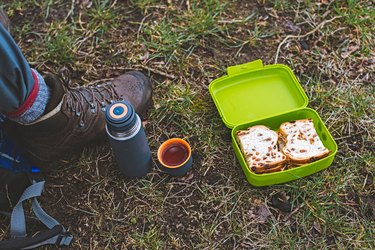
Whether you're spending the weekend trekking through the mountains or a day meandering through the woods, you need fuel to keep you going. It can be challenging to come up with hiking lunch ideas that are tasty yet portable, but the length of your hike and other variables determine your options.
Hiking Snack Ideas
Video of the Day
Going out and back in one day gives you more hiking lunch options. You can take some fresh foods that you won't have to worry about spoiling while you're on the trail. You can also take an ice pack in your backpack to keep sandwiches with meat or other perishable ingredients at the proper temperature — below 40 degrees Fahrenheit, according to the Academy of Nutrition and Dietetics.
Video of the Day
However, you'll want to consider the weight of your pack and your body size and strength. Packing a four-course meal and ice packs to keep it cool is going to put a lot of strain on your body and slow you down. Although your lunch will be fresh and delicious, carrying it may make your hike a lot less enjoyable. And remember, you still have to carry water.
So think light. Hiking lunches don't have to be full meals. They could be a collection of tasty snacks that you eat as you go or graze on while you rest on a rock at midday. Some hiking food ideas with no cooking or cooling required include:
- Trail mix
- Packets of nut butter and slices of whole-grain bread
- Granola bars (choose low-sugar varieties)
- Stay-fresh tuna salad pouches
- Apples, carrot sticks, celery sticks, bananas and other fruits and veggies that can go a longer period without refrigeration.
- Beef, chicken or salmon jerky (shelf stable and low sodium)
- Dried and freeze-dried fruits and vegetables
- Whole-grain crackers and shelf-stable cheeses
Longer Hiking Lunch Ideas
When you're going out for a multi-day hike, it's even more important to control your pack's weight. All of the ideas above, except perhaps for the fresh fruits and veggies, can go the extra mile. Many backpackers choose to carry dehydrated foods that they then rehydrate on the trail, with either cold or warm water.
You can find a variety of prepackaged hiking and camping meals at outdoor stores, containing dehydrated meat, chicken, beans, pasta, potatoes and other vegetables. These days, the options range from homestyle chicken and dumplings to culinary delights like Pad Thai and risotto — although don't expect them to taste like the real thing.
If you're hiking in cooler weather and carrying a stove, these packaged meals will be just the ticket to warm you up when you add hot water. In the summer months, hot meals at midday aren't going to be as appealing. In that case, why not try a "trail salad" recommended by the Pacific Crest Trail Association. This combination of dehydrated veggies, chicken and seasonings that rehydrates with cold water on the trail does require preparation ahead of your hike, including the use of a food dehydrator.
Read more: 10 High-Protein Snacks You Can Eat on the Go
Nutrition and Hydration Tips
Your nutrition on multi-day hikes, strenuous hikes and hikes in extreme temperatures requires deeper consideration to ensure you get the right amount of calories, carbs, protein and fats.
But first, hydration. According to the NOLS Wilderness School, water is the most important nutrient, and you should plan your hydration needs before considering your solid food needs. NOLS recommends bringing one-half liter of water for each hour of moderately strenuous hiking in moderately warm weather. For hot weather conditions, plan for more.
You need plenty of water for cold weather hikes as well, but the thirst mechanism is often suppressed, according to the Boston Chapter of the Appalachian Mountain Club, so more conscious effort to hydrate must be made.
Your calorie requirements increase while you're hiking — by how much depends on many factors including your regular calorie needs, body weight, age and gender, as well as how hard and how long you hike. Weather can also affect your calorie needs. During hot weather, your body expends more energy trying to cool itself than it does in temperate or colder weather, according to the American Council on Exercise.
Take some time before your hike to figure out what your calorie needs will be, so you can plan a hiking lunch menu that will replenish your energy stores and keep you going.
- Academy of Nutrition and Dietetics: "5 Food Tips for Camping and Hiking"
- Pacific Coast Trail Association: "Trail Salad Recipes"
- NOLS: "Basic Nutrition for Backpacking"
- Boston Chapter of the Appalachian Mountain Club: "Food and Nutrition for Winter Hiking"
- ACE: "Do I Burn More Calories When It Is Hot Outside or Cold?"